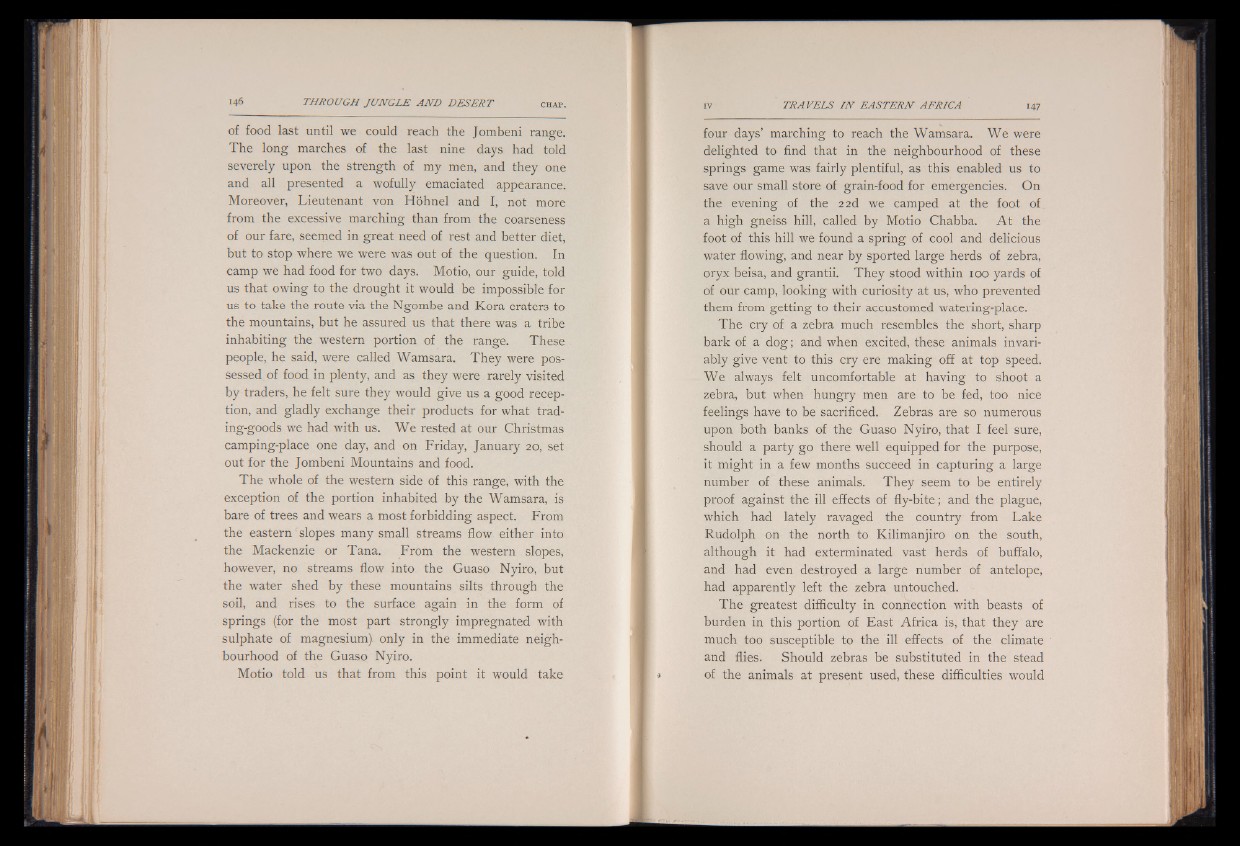
of food last until we could reach the Jombeni range.
The long marches of the last nine days had told
severely upon the strength of my men, and they one
and all presented a wofully emaciated appearance.
Moreover, Lieutenant von Hohnel and I, not more
from the excessive marching than from the coarseness
of our fare, seemed in great need of rest and better diet,
but to stop where we were was out of the question. In
camp we had food for two days. Motio, our guide, told
us that owing to the drought it would be impossible for
us to take the route via the Ngombe and Kora craters to
the mountains, but he assured us that there was a tribe
inhabiting the western portion of the range. These
people, he said, were called Wamsara. They were possessed
of food in plenty, and as they were rarely visited
by traders, he felt sure they would give us a good reception,
and gladly exchange their products for what trad-
ing-goods we had with us. We rested at our Christmas
camping-place one day, and on Friday, January 20, set
out for the Jombeni Mountains and food.
The whole of the western side of this range, with the
exception of the portion inhabited by the Wamsara, is
bare of trees and wears a most forbidding aspect. From
the eastern slopes many small streams flow either into
the Mackenzie or Tana. From the western slopes,
however, no streams flow into the Guaso Nyiro, but
the water shed by these mountains silts through the
soil, and rises to the surface again in the form of
springs (for the most part strongly impregnated with
sulphate of magnesium), only in the immediate neighbourhood
of the Guaso Nyiro.
Motio told us that from this point it would take
four days’ marching to reach the Wamsara. We were
delighted to find that in the neighbourhood of these
springs game was fairly plentiful, as this enabled us to
save our small store of grain-food for emergencies. On
the evening of the 2 2d we camped at the foot of
a high gneiss hill, called by Motio Chabba. A t the
foot of this hill we found a spring of cool and delicious
water flowing, and near by sported large herds of zebra,
oryx beisa, and grantii. They stood within 100 yards of
of our camp, looking with curiosity at us, who prevented
them from getting to their accustomed watering-place.
The cry of a zebra much resembles the short, sharp
bark of a dog ; and when excited, these animals invariably
give vent to this cry ere making off at top speed.
We always felt uncomfortable at having to shoot a
zebra, but when hungry men are to be fed, too nice
feelings have to be sacrificed. Zebras are so numerous
upon both banks of the Guaso Nyiro, that I feel sure,
should a party go there well equipped for the purpose,
it might in a few months succeed in capturing a large
number of these animals. They seem to be entirely
proof against the ill effects of fly-bite; and the plague,
which had lately ravaged the country from Lake
Rudolph on the north to Kilimanjiro on the south,
although it had exterminated vast herds of buffalo,
and had even destroyed a large number of antelope,
had apparently left the zebra untouched.
The greatest difficulty in connection with beasts of
burden in this portion of East Africa is, that they are
much too susceptible to the ill effects of the climate
and flies. Should zebras be substituted in the stead
of the animals at present used, these difficulties would